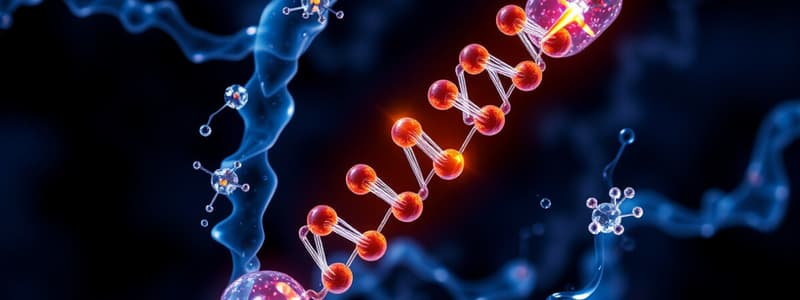Podcast
Questions and Answers
What is free energy?
What is free energy?
The portion of a biological system's energy that can perform work when temperature and pressure are uniform throughout the system.
What is the equation for calculating the change in free energy (△G)?
What is the equation for calculating the change in free energy (△G)?
△G = △H - T△S
What is an exergonic reaction?
What is an exergonic reaction?
A spontaneous chemical reaction in which there is a net release of free energy.
What is an endergonic reaction?
What is an endergonic reaction?
What is ATP (adenosine triphosphate)?
What is ATP (adenosine triphosphate)?
What is a phosphorylated intermediate?
What is a phosphorylated intermediate?
What is energy coupling?
What is energy coupling?
Flashcards are hidden until you start studying
Study Notes
Free Energy
- Represents the portion of energy in a biological system available to perform work under uniform temperature and pressure.
- Change in free energy (△G) is calculated using the equation: △G = △H - T△S.
- △H signifies change in enthalpy (total energy), T is absolute temperature, and △S is change in entropy.
Exergonic Reaction
- Defined as a spontaneous chemical reaction.
- Characterized by a net release of free energy during the reaction.
Endergonic Reaction
- A non-spontaneous chemical reaction that requires an input of free energy.
- Free energy is absorbed from the surroundings to drive the process.
ATP (Adenosine Triphosphate)
- Composed of adenine, ribose, and three phosphate groups.
- Releases free energy upon hydrolysis of its phosphate bonds.
- This energy is utilized to energize endergonic reactions within cells.
Phosphorylated Intermediate
- A compound with a covalently attached phosphate group.
- Increases reactivity and decreases stability compared to its unphosphorylated form, facilitating chemical reactions.
Energy Coupling
- Involves using energy released from exergonic reactions to power endergonic reactions.
- Essential in cellular metabolism for efficient energy use and reaction management.
Studying That Suits You
Use AI to generate personalized quizzes and flashcards to suit your learning preferences.

